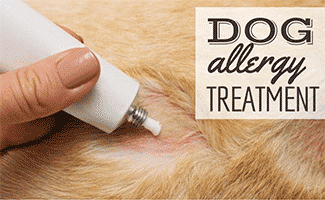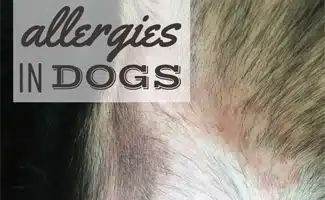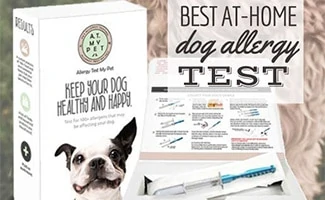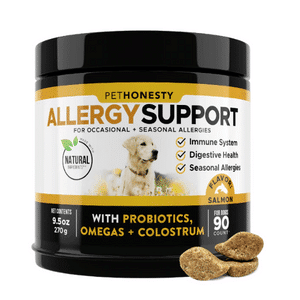What’s The Best Allergy Relief For Dogs?
To keep the lights on, we receive affiliate commissions via some of our links. Our review process.

Unfortunately, allergies are quite common in dogs, and they can be allergic to a variety of things. The most common culprits are environmental allergens, fleas, and food. If you think your dog has an allergy, you’re likely wondering what veterinary treatment is available. Or if your pup’s symptoms are mild, what are your best options for at-home allergy relief for dogs? We’ll help you navigate the complicated and worrisome problem of how to treat dog allergies.
Dog Allergy Symptoms
For starters, it helps to understand how dog allergy symptoms appear and what the possible causes could be for your pup.
Allergic Skin Reactions
Allergic skin reactions, called allergic dermatitis, are the most common symptom of allergies in dogs. These can be caused by fleabites, environmental allergens (inhaled or direct contact), and food. Dog skin allergy treatment varies based on the cause. Allergic dermatitis symptoms include:
- Frequent itching (localized or over the entire body)
- Excessive licking
- Biting, chewing, and gnawing at skin
- Red, inflamed skin
- Dry or oily skin
- Rashes
- Hives and other bumps
- Hair loss
- Swollen face and paws
Other Allergic Reactions
While food allergies most often cause skin reactions, they can also appear as gastrointestinal (GI) issues in some dogs. And environmental allergens can cause both skin reactions and respiratory symptoms.
- Vomiting
- Diarrhea
- Sneezing
- Coughing
- Runny eyes or nose
- Itchy ears
- Chronic ear infections
How Do I Figure Out What’s Causing My Dog’s Allergies?
It’s often very tricky to pinpoint the cause of dog allergies, so consulting your veterinarian is usually the best course of action. An additional avenue is to give your pup an at-home dog allergy test kit, which tests for .sensitivity or intolerance to food and environmental factors. Then, you can share these results with your vet to work on a treatment plan.
How To Treat Dog Allergies
Dog allergy treatment depends on the cause. Because it’s often tricky to figure out the offending allergen, you should get a diagnosis from your veterinarian, who can then determine the best treatment plan.
Dog Flea Allergy Dermatitis Treatment

Many dogs are allergic to flea saliva, which leads to a condition called flea allergy dermatitis (FAD). FAD causes extreme itchiness, hair loss, and scabs. Getting rid of the fleas and continuous flea control are the best ways to address a flea allergy.
To treat the symptoms, you can use an over-the-counter (OTC) itch-relief shampoo or spray in mild cases. In severe FAD cases, your veterinarian may prescribe an antihistamine or corticosteroid (steroid) to relieve the itching and inflammation. Your vet may also prescribe an antibiotic if your pup has developed a secondary bacterial infection.
Dog Food Allergy Treatment
Dogs of any age and breed can develop a food allergy at any time in their lives. The most common food allergens in dogs are beef, chicken, lamb, chicken eggs, dairy products, wheat gluten, and soy, but dogs can be allergic to many other ingredients. Food allergies can cause itchy skin, GI problems, and respiratory symptoms.
Unfortunately, medications like antihistamines and steroids aren’t very effective in treating food allergy symptoms. So, the best dog food allergy treatment involves identifying and eliminating the allergen from your pup’s diet. If your dog’s allergies aren’t severe, you can try out one of our picks for the best dog food for allergies to see if that helps.
But the best course of action is to consult your veterinarian, who will likely put your dog on an exclusive trial elimination diet of hypoallergenic food for two to three months (it takes that long for other foods to exit the body). If symptoms improve, your vet will recommend the best long-term diet for your pup.
Inhalant Allergy Treatment
More dogs suffer from inhalant allergies (atopy) than other types of allergies. The most common culprits are pollen (from trees, grasses, or weeds), dust mites, molds, and mildew. In many dogs, these are seasonal, but others can suffer symptoms all year. Unlike humans, dogs with atopy usually develop itchy skin rather than respiratory symptoms.

Airborne allergies can’t be cured, but several types of therapy can provide allergy relief for dogs. Treatment can depend on the specific allergen and the length of symptoms. For dogs with seasonal allergies, anti-inflammatory corticosteroids can be quite effective. However, steroids have bad side effects with long-term use.
For longer-term treatment, antihistamines may work for some dogs, and research has shown that coupling antihistamines with essential fatty acids provides better relief than using either product alone. Newer dog allergy medications such as the daily oral medicine Apoquel and Cytopoint, an injection given every one to two months, can be effective in some dogs. Your vet can determine which medication is best for your pup.
If an allergy test identifies a specific allergen, another treatment option is immunotherapy (aka allergy shots). This vet treatment involves regular injections of small amounts of the allergen with the idea that repeated exposure will build up a dog’s tolerance to that allergen. Immunotherapy provides relief in 60% to 80% of dogs with atopic dermatitis due to airborne allergens.
Contact Allergy Treatment
Less common than other causes, contact allergies result from direct contact with an allergen and cause itchy, irritated skin at the contact point. In these cases, allergens can be topical medications, flea collars, grasses, pollen, fabrics on bedding, furniture, or carpet, etc. Identifying and removing the culprit from your dog’s environment is the only real solution to contact allergies.
What If My Dog Has A Contact Allergy To Grass?
Obviously, you can’t entirely eliminate grass exposure, but there are ways you can help alleviate the problem. In the video below, a veterinarian explains some of the best dog grass allergy treatment options.
Dog Eye Allergy Treatment
While allergic reactions to environmental factors like pollen, dust, or mold usually show up as skin problems, some dogs develop red, inflamed, and itchy eyes. Veterinarians call this allergic conjunctivitis. Dogs with allergic dermatitis (skin allergies) are more prone to develop allergic conjunctivitis than dogs with no other allergy symptoms.
Mild cases may clear up simply by flushing your pup’s eyes with sterile saline twice a day. Otherwise, you should see your vet, who can prescribe steroid-based eye drops. Severe cases may also require oral prescription medication.
Acute Allergic Reactions
Although rare, some dogs can have an acute, severe allergic reaction, which causes them to go into anaphylactic shock, or anaphylaxis. Symptoms, including hives, swelling, vomiting, drooling, respiratory distress, collapsing, etc., appear suddenly and can be life-threatening. Bee stings, medications, and vaccines are the most common causes of acute reactions.
If you think your dog is suffering from anaphylaxis, seek emergency veterinary care immediately. Vet treatment for anaphylactic shock can include medication to combat the reaction, IV fluids, oxygen, and more.
Best Dog Allergy Medications
If you’re wondering what medications your vet may prescribe or recommend for your pup’s allergies, check out our articles on the best allergy medications for dogs and allergy shots for dogs. Not all dogs respond well to all allergy medicine, so your vet may need to tweak your pup’s medication therapy to find the best treatment.
At-Home Allergy Relief For Dogs
If you’re wondering how to help your dog’s allergies at home, you’re in luck. Several effective OTC products can relieve allergy symptoms both in the short and long term.
Topicals
If your pup is having an allergy flare-up, special shampoos, sprays, or balms can help ease his itchy and inflamed skin. Here are our recommendations for the best allergy relief for dogs in OTC topical form.
All-Natural Supplements
If you’re looking for natural allergy relief for dogs, supplements may help your pup’s symptoms over the long term and also promote a stronger immune system (which helps the body fight against allergies). These supplements contain such beneficial ingredients as omega fatty acids (fish oils), colostrum, apple cider vinegar, and more to help relieve irritated skin. Many also include probiotics to help with allergy-associated digestive problems. We recommend:
Before giving your pup any supplement, check with your vet to make sure it’s safe and isn’t going to interfere with other allergy treatments or medications.
Pet Insurance Can Help Pay Vet Bills
Dogs can develop so many chronic health conditions, like allergies, over their lifetimes — as well as unforeseen illnesses and accidents. But if you get pet insurance early in your dog’s life before a condition is considered pre-existing, future health issues that arise could be covered for vet visits and prescription medications. See our reviews of the best pet insurance companies to learn more.
Tagged With: Allergies









